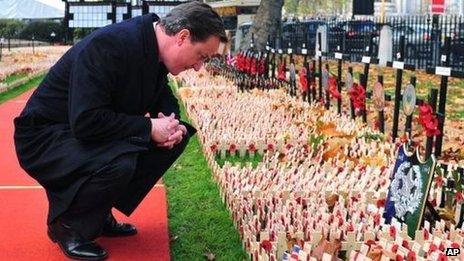WWI centenary remembrance plans given £50m by government
- Published

David Cameron, seen here in 2009 looking at commemorative crosses, says he wants the WWI centenary to create an "enduring legacy" for future generations
More than £50m has been allocated for a "historic" commemoration of the centenary of the start of World War I, David Cameron has announced.
Speaking at the Imperial War Museum, the prime minister said he wanted a truly national commemoration.
He also announced an advisory board, which includes Culture Secretary Maria Miller, to oversee the events.
It comes as a survey for a think tank suggests 69% of people want Remembrance Day 2014 to be a special national day.
Mr Cameron says the commemorations in 2014 will comprise "three vital elements".
A "massive" transformation of the Imperial War Museum "to make it even more incredible"
A major programme of national commemorative events "properly funded and given the proper status they deserve"
An educational programme "to create an enduring legacy for generations to come"
David Cameron: "Our duty towards these commemorations is clear. To honour those who served"
The prime minister went on to say that these will be overseen by a "world class advisory board" chaired by the Ms Miller and supported by "my own special representative" Andrew Murrison.
Other members of the board will include former defence secretaries Tom King and George Robertson, former Liberal Democrat leader Sir Menzies Campbell, former chief of the defence staff Jock Stirrup and former chief of the general staff Richard Dannatt.
Historian Hew Strachan and author Sebastian Faulks, who wrote the World War I novel Birdsong, will also be on the board.
Contemporary significance
"It is absolutely right that these commemorations should be given such priority," Mr Cameron said.
"Our duty with these commemorations is clear. To honour those who served. To remember those who died. And to ensure that the lessons learnt live with us for ever. And that is exactly what we will do."
During his speech, the prime minister said that Heritage Lottery Fund was announcing an additional £6m to enable young people working in their communities to conserve and share local heritage of WWI.
It has already given £9m to projects marking the centenary, including community heritage projects.
Mr Cameron said the fund, which distributes a share of the income from the National Lottery, is also calling for more applications for WWI-themed ideas.
"The centenary will also provide the foundations upon which to build an enduring cultural and educational legacy to put young people front and centre in our commemoration and to ensure that the sacrifice and service of 100 years ago is still remembered in 100 years' time."
And Mr Cameron also said the £50m funding included a further £5m being given to the project to redevelop the Imperial War Museum in London,, external adding to the £5m already awarded. This matches contributions from private, corporate and social donors, he added.
Also, £5.3m is being given to schools in England to pay for trips to the battlefields for "thousands" of children from 2013 to 2019.
BBC political correspondent Iain Watson says that while Mr Cameron wanted to use his speech to talk to young people about commemorating the past, the year 2014 also has a contemporary significance.
It is when the referendum on Scottish independence will be held, so a reminder of what the nations of the UK have achieved together is seen as not unhelpful to the unionist cause, our correspondent says.
Sporting postponements
Meanwhile, British Future is calling for shops to close and flags to fly at half-mast out of respect for the fallen soldiers.
It also wants sporting fixtures such as Premier League football matches to be postponed and a longer period of silence to be observed.
The YouGov online poll on behalf of the think tank British Future asked more than 1,700 British adults whether they believed Remembrance Sunday 2014 should be commemorated differently.
More than 80% of respondents thought bells should be rung across the UK and flags should fly at half-mast, and just over half thought major sports events should be moved to another day.
But the survey showed people were divided over whether shops should be closed - with 45% for and 45% against the proposal.
British Future director Sunder Katwala said: "We all need to decide if Remembrance Sunday in 2014 is going to feel pretty much like any other Sunday... or should this be a special Sunday where we close the shops and have a football-free day and find ways to bring us together and understand our history and the country we have become?"
- Published11 October 2012
- Published13 November 2011
- Published8 November 2011